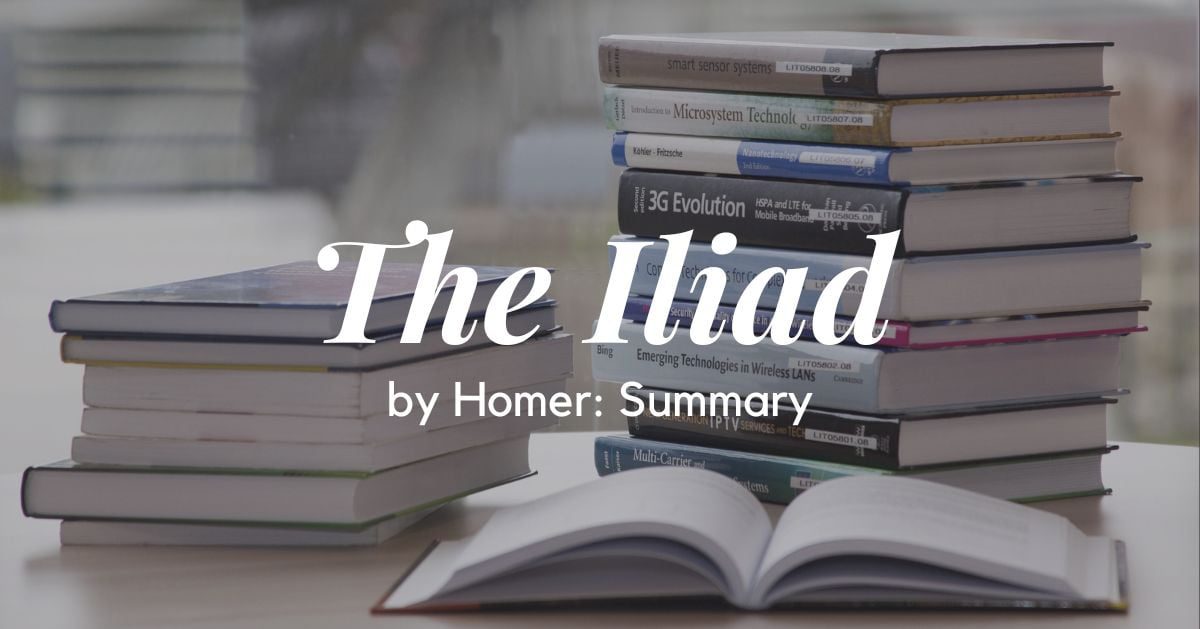The Iliad by Homer: Summary

“The Iliad,” credited to the old Greek writer Homer, is a great incredible that has enthralled perusers for quite a long time. Including around 15,000 lines of verse, this old work illustrates the Trojan Conflict, winding around together topics of chivalry, struggle, destiny, and the exchange among humans and divine beings.
The Setting and Characters
Set against the scenery of Troy, an incredible city under attack, “The Iliad” presents a large group of vital characters. The Greek legend Achilles, filled by his unequaled grit and a profound well of outrage, remains at the very front. Contradicting him is Hector, the respectable Trojan ruler, a man of boldness and familial dedication. The epic likewise includes Agamemnon, the Greek chief; Priam, the matured lord of Troy; and a pantheon of divine beings living on Mount Olympus.
A Conflict of Self images: Achilles and Agamemnon
The work’s story ignites with a contention among Achilles and Agamemnon, two central figures whose battle begins a chain of events. Agamemnon’s refusal to return a hostage lady, Chryseis, to her dad prompts a heavenly plague on the Greeks. To control the displeasure of Apollo, Chryseis is returned, however in counter, Agamemnon guarantees Achilles’ mistress, Briseis. This attack against Achilles’ honor makes way for serious clash.
[You can Also Read: The Odyssey by Homer: Summary]
The Idea of “Arete”
The Greek idea of “arete,” enveloping greatness in fight and respectable excellencies, is a repetitive topic. Achilles epitomizes this ideal, with his battle zone capacity and extraordinary mental fortitude. Anyway, his pride and uncontrolled wrath subvert his associations and honor. Hector, then again, encapsulates an alternate feature of “arete,” showing boldness and love for his family and city.
Divine Mediations: Divine beings in the Human World
The divine forces of Olympus assume an essential part in the occasions of the conflict. They intercede in the presences of people, framing destinies and influencing results. Apollo’s revenge, Athena’s knowledge, and Zeus’ troublesome activity among fate and individual associations feature the superb presence in human issues. These mediations elevate the strain among destiny and freedom of thought.
[You can Also Read: The Divine Comedy by Dante Alighieri: Summary]
The Pull of Destiny and Freedom of thought
Key to “The Iliad” is the subject of destiny versus through and through freedom. Achilles, confronting the decision between a long however unexceptional life and a short yet incredible one, decides on the last option, embracing a predetermined predetermination that prompts his inconvenient demise. This choice typifies the stunning care that even legends ought to regard the coordinates of fate.
War’s Cost for Mankind
While fights and bravery become the dominant focal point, “The Iliad” doesn’t avoid the close to home cost of war. The juxtaposition of epic struggles with strong depictions of lamenting elements the massive impact of setback on individuals and organizations. Priam’s visit to Achilles to argue for Hector’s body fills in as a strong sign of shared humankind and the distress that rises above hatred.
Homer’s Wonderful Craftsmanship
Homer’s wonderful style is set apart by raised language, perplexing likenesses, and monotonous designs that guide in oral recitation. Formed in the eighth century BCE, “The Iliad” embodies the oral custom of that time, with cadenced and melodic characteristics that work with remembrance and execution. This style adds to the undying allure of the epic.
[You can Also Read: The Grapes of Wrath by John Steinbeck: Summary]
Conclusion:
In total, “The Iliad” stays a demonstration of the persevering through force of narrating. Its examination of fortitude, battle, and the human condition transcends time and culture. Through its characters and subjects, the incredible addresses comprehensive pieces of the human experience, from the struggles of internal identities to the exchange among divine creatures and people. With its resonation across ages, “The Iliad” stays as a show of the persevering through impact of old composition on how we could decipher the complexities of mankind.
